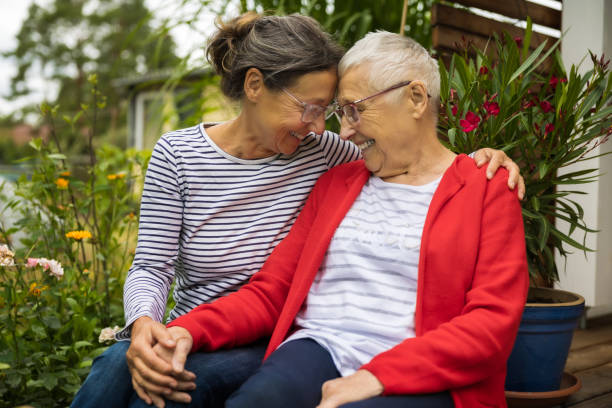Caregivers and seniors often face unique challenges that can trigger anxiety. Managing this anxiety effectively is crucial to ensuring both parties lead satisfying and tranquil lives. Here are seven robust strategies designed to help caregivers and their seniors cope with anxiety.
Contents
Understanding Caregiver Anxiety
Caregiver anxiety is a prevalent issue that arises from the immense responsibility and emotional strain of providing care. It can manifest in various ways, including chronic stress, exhaustion, and feelings of overwhelm. Recognizing the signs and symptoms of anxiety in caregivers is the first step toward implementing effective solutions and ensuring their well-being. In this section, we will explore the root causes of caregiver anxiety, common indicators, and practical strategies to manage and mitigate its impact.
What Causes Anxiety in Caregivers?
Caregiving is a demanding role that encompasses physical, emotional, and mental efforts. Many factors contribute to caregiver anxiety, including the fear of the unknown, financial stress, and the emotional toll of watching a loved one struggle. Recognizing these causes is the first step toward managing anxiety effectively.
Signs of Caregiver Anxiety
Common signs of anxiety in caregivers include irritability, fatigue, insomnia, and feelings of overwhelm. It’s essential to be vigilant and recognize these symptoms early to address them promptly.
Strategies to Alleviate Anxiety
Addressing anxiety in caregivers and seniors requires a comprehensive approach that prioritizes both mental and physical well-being. By implementing these evidence-based strategies, both caregivers and seniors can build resilience, enhance their quality of life, and cultivate a sense of peace and stability.
1. Establish a Routine
Creating a structured daily routine can provide a sense of predictability and control, which is particularly beneficial for reducing anxiety. Ensure that this routine includes time for self-care, as it’s just as important as the care provided to the senior.
2. Practice Mindfulness and Meditation
Mindfulness and meditation are proven techniques to help manage stress and anxiety. These practices encourage living in the moment rather than worrying about the future. Caregivers can benefit from short daily meditation sessions to center their minds and alleviate tension.
Coping Strategies for Seniors

Coping with anxiety as a senior can be a multifaceted challenge, but it is far from insurmountable. By understanding the unique anxieties faced by seniors and implementing targeted strategies, we can significantly enhance their sense of well-being and security. Here, we explore actionable steps to empower seniors with the tools they need to manage anxiety effectively.
3. Encourage Physical Activity
Physical activity can significantly reduce symptoms of anxiety and improve overall well-being. Encourage seniors to engage in regular exercise tailored to their capabilities, such as walking, yoga, or gardening, which promote physical health and act as a mental health booster.
4. Foster Social Connections
Isolation and loneliness can exacerbate anxiety in seniors. Foster opportunities for social interaction through community groups, family visits, or virtual meetups. Engaging in social activities can provide emotional support and increase a sense of belonging and purpose.
5. Develop Hobbies and Interests
Encouraging seniors to cultivate hobbies and interests provides a productive distraction from anxious thoughts. Whether it’s reading, knitting, or painting, pursuing these interests can improve mental focus and reduce anxiety.
Additional Support and Resources
Navigating the complexities of anxiety management for seniors requires a robust support system and access to reliable resources. It is essential to incorporate a variety of tools and services that cater to their unique needs, ensuring they have comprehensive assistance at their disposal. The following section outlines key resources and support mechanisms designed to empower seniors and their caregivers in improving mental health and well-being.
6. Seek Professional Help
Sometimes, professional help is necessary. Therapists specializing in geriatric care or caregiver support can provide crucial strategies and tools to manage anxiety effectively. It’s important to seek help when stress becomes overwhelming.
7. Utilize Respite Care Services
Respite care services offer temporary relief, giving caregivers a much-needed break. This service ensures that seniors continue to receive quality care while caregivers rejuvenate and return more equipped to handle the challenges. Research local respite care options and integrate them into your care strategy.
Healthy Lifestyle Practices
Maintaining a healthy lifestyle is paramount for managing anxiety in seniors. A balanced approach, combining physical activity, a nutritious diet, and adequate rest, can significantly enhance overall well-being and help mitigate the effects of anxiety. This section delves into practical lifestyle practices that seniors can adopt to promote mental and physical health, fostering a more serene and fulfilling life.
8. Maintain a Balanced Diet
Proper nutrition is vital for both physical and mental health. Ensure that seniors have access to a balanced diet rich in fruits, vegetables, whole grains, and lean proteins. A healthy diet can improve mood, energy levels, and overall well-being. Work with a nutritionist to tailor meal plans that meet the specific dietary needs of seniors.
9. Ensure Adequate Sleep
Quality sleep is fundamental to mental health and can significantly reduce anxiety. Encourage a consistent sleep routine and create a restful environment conducive to sleep. Consider factors such as room temperature, comfortable bedding, and minimizing disturbances. If sleep issues persist, consult a healthcare provider for further evaluation and management.
10. Promote Regular Physical Activity
Sustained physical activity is crucial for maintaining health and reducing anxiety. Design exercise routines that align with the senior’s abilities and preferences, ensuring they are both safe and enjoyable. Activities like stretching, low-impact aerobics, and tai chi can be particularly beneficial. Always consult with a healthcare provider before starting any new exercise regimen.
Conclusion
Managing anxiety is a multifaceted process that requires awareness, proactive strategies, and, often, external support. By establishing routines, practicing mindfulness, encouraging physical activity, fostering social connections, developing interests, seeking professional help, and utilizing respite care, both caregivers and their seniors can achieve a more balanced and less anxiety-ridden life. Remember, addressing and managing anxiety effectively is not just about coping but enhancing the quality of life for everyone involved.

